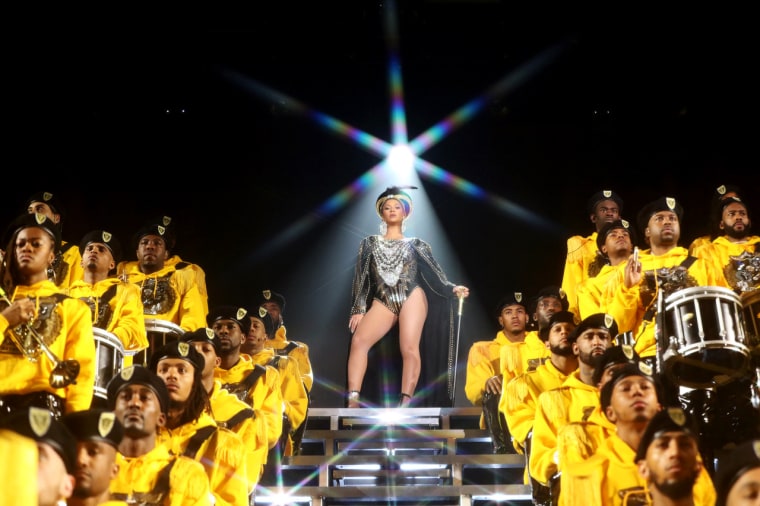“When I decided to do Coachella, instead of me pulling out my flower crown, it was more important that I brought our culture to Coachella,” Beyoncé shares more than 30 minutes into “Homecoming,” her newly released Netflix concert documentary chronicling her historic headlining experience in 2018. “Our culture,” in this context, refers to black American culture, specifically that which has been preserved and nurtured at HBCUs (Historically Black Colleges and Universities).
As Charlamagne Tha God observed during his popular televised radio show, “The Breakfast Club,” even as Beyoncé and her husband Jay-Z have become increasingly powerful and embraced by the mainstream, they have never abandoned their roots. Indeed, they have doubled down on their black identity, something that has traditionally not been true of popular black artists like Michael Jackson in the past.
In an era where black kids are celebrated for their Ivy League acceptances, Beyoncé’s praise of HBCUs in “Homecoming” is a powerful affirmation of their continued value. Teenage Beyoncé’s desire to attend an HBCU is no newsflash for the millions of others like her who understand and respect HBCU history. Before earning a doctorate at Boston University, Dr. Martin Luther King Jr. graduated from Morehouse College in Atlanta; Oprah Winfrey is an alum of Tennessee State University in Nashville; presidential candidate Kamala Harris graduated from Howard University in Washington D.C. In an age when so many of the lesser known HNBCU institutions like Bennett College in North Carolina are struggling to keep their doors open, Beyoncé shouting out their collective greatness from every corner of Coachella is a huge boost.
SIGN UP FOR THE THINK WEEKLY NEWSLETTER HERE
Beyoncé was raised on the grandeur of events like the Battle of the Bands, which she witnessed at Prairie View A&M, just north of her hometown of Houston. (In recent years, Honda has sponsored a popular version of the event in which Prairie View has competed.) Destiny’s Child, in its early stages, practiced at Texas Southern University, the HBCU in her hometown that Michael Strahan attended and where her father and former manager Mathew Knowles is a visiting professor. Black college homecomings thrive on theatrics. Every year is a challenge; how will you best last year’s performance?
Beyoncé’s decision to perform her music with a black college band — or a “black orchestra,” as she calls it in “Homecoming” — created a sound familiar to those of us who have attended the epic marching band clashes at various homecomings and “classics.” (The Bayou Classic, held every Thanksgiving weekend in New Orleans and aired on NBC, has pitted Louisiana school rivals Grambling State University and Southern University against each other for nearly 50 years.) The events have long included energetic covers of Beyoncé and Destiny’s Child songs, complemented by elaborate formations. At other schools, attendees may come to see the game; at black colleges, the halftime performance is the real draw. A good game is just a bonus.
Decades ago, halftime performances with dancers like the Prancing J-Settes from Jackson State University in Mississippi and the Stingettes from Alabama State University were some of the few times when black female beauty was truly celebrated. “Black women often feel underestimated. I wanted us to be proud of not only the show, but the process," Beyoncé says in "Homecoming." "I wanted everyone to feel thankful for their curves, their sass, their honesty — thankful for their freedom.” Beyoncé’s regality and electrifying showmanship in “Homecoming” isn’t new for fans of black college bands used to seeing women in this light. But its celebration on this large a platform is.
Beyoncé’s regality and electrifying showmanship in “Homecoming” isn’t new for fans of black college bands. But it is being presented on the biggest stage to date.
Beyoncé didn’t simply want to reference these traditions — she wanted to elevate and safeguard them for all the world to see. “Homecoming” makes this clear. Beyoncé’s attention to detail is impressive. At one point in “Homecoming,” she obsesses over making sure the greatness of the music gets its due in the film. She wants it to sound as amazing streaming on Netflix as it did live. For decades, many have carried that greatness around like a myth. Here, Beyoncé is committed to preserving it for posterity. There’s a reason why both Spike Lee’s “School Daze” and "Drumline" are treasured cult classics.
There's a popular belief that "a woman carries the culture." Beyoncé manifests that truth here. Towards the end of “Homecoming,” she whispers the words of the Black National Anthem, “Lift Every Voice and Sing" in her oldest daughter Blue Ivy’s ear. When Blue Ivy sings it back, Beyoncé praises her, not only demonstrating how a mother loves and supports her child but also how a culture celebrates its traditions by passing them on to the next generation.
In “Homecoming,” Beyoncé lives up to a Maya Angelou quote featured in the documentary: “Tell the truth, to yourself first. And to the children. Live in the present, don’t deny the past. Live in the present, and know the charge on you is to make this country more than it is today.” By putting her culture — her black culture — on Coachella’s main stage with no apologies, she’s pushed black colleges and their traditions into the mainstream.

